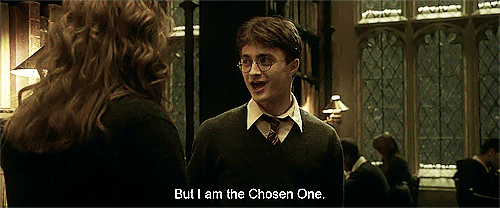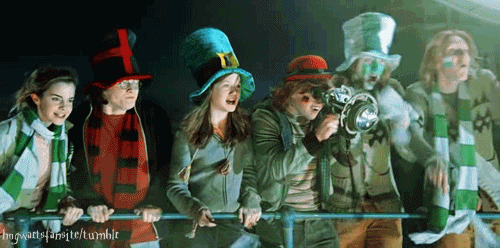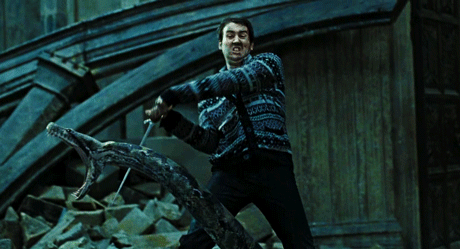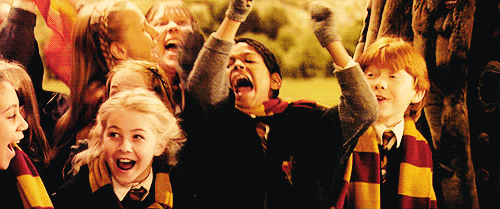Gryffindors Are Under Attack (And Not by Lord Voldemort for Once!)
Where have all the Gryffindors gone?!
There used to be a time not so long ago when we would shout out with pride that we were a Gryffindor. But while we sat around a table in a cozy pub at a Harry Potter society meeting, my fellow Gryffindors and I were hugely outnumbered. Not only did this not go unnoticed, but we entered into a debate as to why the popularity of Gryffindor seems to have dipped, and it was at this moment that I felt this needed to be addressed!
The main point that was thrown around the most (*cough* by the Head of Slytherin) was that anyone can be brave, and in real life — a.k.a. when Lord Voldemort isn’t chasing you — there are other qualities that are more important. Now, to a point I do agree, but I feel that Gryffindor is being given a particularly rough time. There is almost a stigma associated with the fact it was Harry’s House; it has been mentioned that some fans find that people say they’re a Gryffindor just as an easy option or to end the self-searching question of “What house should I really be in?” We all know that Harry made some poor choices about how to tackle the issues he was facing, but he used a special type of bravery to solve this. He learned from his mistakes and (eventually) was able to admit to them. I think we forget that we followed Harry through the tough teenage years, and I am sure we’d all agree that we, too, did some pretty silly things.
I often feel that the Gryffindors have a special camaraderie: They strive to change things for the better and aren’t put off by the fact that this isn’t always the easy option. I’m not saying this is a unique quality, but it is an important one. A good example is the unity the House showed against Professor Snape in Prisoner of Azkaban. They all stuck up for Hermione when Snape called her “an insufferable know-it-all.” Also, don’t forget that it was a no-brainer for the Gryffindors to stay for the Battle of Hogwarts; they rallied together to fight for what was right. Another character deserves some recognition here, too. Ron Weasley had many a battle with himself; we saw him in Goblet of Fire fighting with his own insecurities, but he came around and was there to support Harry when it mattered. We see this repeated again in Deathly Hallows, but he came back instead of doing the easy option and leaving for good.
The female characters featured within Gryffindor deserve a special mention here, too. Not only do we have the formidable and awesome Minerva McGonagall who was a pillar of strength and knowledge, but there are many other fierce females. Ginny Weasley always stood up for what she believed in and for those less able than herself, and even though Lavender Brown slightly lost herself when she was with Ron, she still stayed and fought against the dark powers and at the final battle. Gryffindor is also the home of Hermione, the brightest witch of her age. I think we all wish for such a loyal and strong female friend in our lives. She manages to study harder than anyone I know, but she also understands when her friends need her and the reality of life away from textbook scenarios. She has morals and sticks to them and believes in creating an equal world for everyone to enjoy.
It also seems, to me at least, that Gryffindor House is able to support and encourage their students to grow. Take Neville Longbottom, for instance; his transformation (and I’m not talking about Matt Lewis’s – but still, wow!) was incredible. Who would have thought that from our first introduction to Neville, he would rise up to be a truly great man? But with the companionship, unity, and camaraderie that Gryffindor gave him, he was able to blossom and grow into an incredible (and brave) person.
Hermione is a great example of trying to make the world a better place; she creates SPEW, and even when everyone is trying to stop her, she carries on. A true Gryffindor knows that everyone deserves to be treated as an equal, and Hermione believes in being a voice for those who don’t have one. It is this quality that a lot of Gryffindors have; they don’t boast about it but quietly carry on in an attempt to make the world a better place. They give people the opportunity to better themselves: Dumbledore forgave Snape because he believed he had something inside of him that was worth forgiving, Harry rescued Draco from the Room of Requirement even though he had attacked him, and McGonagall not rising to Dolores Umbridge incessant interfering. Gryffindors have an ability to respect their fellow human beings; it’s a quiet, constant quality that helps to make them a united House.
I’m not saying that the other Houses suck compared to Gryffindor; I’m just trying to make people rethink. Every House deserves its moment, and maybe the time has passed for it to be Gryffindor’s moment, but that doesn’t mean that Gryffindors should be sitting back and letting things slide. Come on, let’s remind everyone why we’re awesome and stand up for what we believe in!






For a Hogwarts House puff-piece, this isn’t too bad. Yes, there probably has been a bit of a fandom backlash against Gryffindor, but I suspect that this has a lot to do with the emergence of fandom Houses created through the Pottermore Sorting and other online “Sorting” tests, which has allowed fans to create idealised versions of the canon Houses (often with invented, canonically dubious virtues) with which to identify. So the tendency to identify with Gryffindor within the fandom has waned. (There are probably other factors at work too, but that’s one that’s often struck me.)
However, your article, through well meant, falls into the same trap, of inventing and exaggerating virtues for Gryffindor and overlooking the negative aspects of the House (such the fact that entitled bullies like James and Sirius and arrogant blowhards like Cormac McLaggen flourish there). For example:
“A true Gryffindor knows that everyone deserves to be treated as an equal”
Do we really see much evidence for this being distinctive to Gryffindor? S.P.E.W. is Hermione’s thing, and she struggles to get any support from within her own House. A couple of former Gryffindors (e.g., Arthur Weasley) are vaguely encouraging, but don’t offer any concrete support. Treating Muggle-borns as equals seems common enough in Gryffindor, but Hufflepuff seems supportive of its Muggle-born members too (in fact, treating people as equals is more a trait associated with Hufflepuff in canon). As for treating Muggles as equals, the most prominent pro-Muggle Gryffindor we see (Arthur Weasley) is a classic paternalistic liberal, patronisingly treating Muggles as quaint. However, to be fair, Gryffindor does have quite a good record on werewolf equality (although one hesitates to generalise from a single example).
Thing is, although plenty of Gryffindors will treat individual outsiders like Lupin or Dobby as equals, Hermione is the only one who seems willing to challenge the institutional inequality within the wizarding world. Even Dumbledore and Arthur Weasley just seek to make the status quo a kinder one, rather than tackling the root causes of oppression. Hermione’s radical egalitarianism isn’t a distinctive Gryffindor trait – it’s a distinctive Hermione trait, reflecting her Muggle upbringing.
You also emphasise the unity and camaraderie of Gryffindor, but that’s kind of the point of the House system, and it’s not clear that this is any more distinctive to Gryffindor than to any of the others. And as for citing fierce female characters within Gryffindor, that doesn’t tell us much about Gryffindor unless you can do a comparison with the female characters in other Houses (selection bias is nobody’s friend).
So is there a tendency within some sections of the fandom to do down Gryffindor unfairly? Probably. But the answer isn’t to idealise Gryffindor in response. The answer is to look carefully at all the Houses, their strengths and their weaknesses, and to take a long, critical look at the House system itself. If one does that, then one might realise just how flawed and arbitrary the system is, and perhaps question whether this kind of stereotyping (and the associated tribalism) is really something one wants to emulate in real life.
Very well written. I completely agree with you! It’s one thing to defend a house; it’s another thing completely to imply it’s better than other houses by making us think the other houses lack the qualities being boasted about.
Ravenclaw is renowned for its logic, wisdom, individuality, and creativity, but this is not to say that people sorted into other houses don’t possess those qualities! God knows Hermione has more smarts than any of her classmates, but she was sorted into Gryffindor! Do we Ravenclaws begrudge this fact? No! (At least, I don’t.)
I, myself, am guilty of being skeptical of people who say they are Gryffindors. More often than not, upon further inquiry, I find that they have not been “properly” sorted on Pottermore, which is as close as we’re gonna get. I had a couple of close friends who felt that they “deserved” to be in Gryffindor, and they would look down their nose at me and scoff when I felt certain I would be sorted into Ravenclaw. This was before Pottermore was released and we all could find out for sure, but can you really blame me for feeling a little resentment for those who use their House to tear others down?
What generally happens is they read the books, perceive Gryffindor to be best house, and insist they belong there, only to find out that they actually should be in Hufflepuff or even, to their horror, Slytherin. The messed up thing about all this is that they are disappointed to be in these houses, when they all have merits of their own!
The house you’re sorted into is meant to bring out the best in you — to highlight what makes you thrive, and encourage you to grow. But when anyone, from any house, assumes their house is the best house, I feel that they are completely missing the point.
Well said, Ravenclaw. As a Slytherin, I receive all types of nasty looks from so-called Gryffindors the minute I divulge my house. They make all sorts of assumptions about me and generally stop being friendly the moment they find out, even though I was nothing but nice and accepting of them. I’ve gotten weird looks from Hufflepuffs too. Ravenclaws are the only ones who just shrug and carry on as normal. I should be able to have pride in my house, should I not? I don’t tear anyone down but “Gryffindors” certainly do. Hypocrites.
I agree with you 100 percent. I am sending you 200000000000 house points to our house.
Yay, for Slytherin, and thanks so much!! Always nice to meet a fellow housemate! 🙂
I know all the people are in Gryiffindor or Ravenclaw (I don’t have anything against Ravenclaws) but there should be more Slytherins out there.
Don’t judge us all by our covers. Not everyone deemed a Gryffindor by the Pottermore site automatically hates Slytherin. Especially when there have been noble members of Slytherin house, and as of The Cursed Child (which, yes, I count as canon) continue to be.
Thanks, although it’s possible that we’re not quite in as much agreement as you suggest, since part of my point was that the emergence of the fandom Houses is partly to blame for articles like these, because the fandom Houses and the canon Houses really aren’t the same things at all, and ought to be more carefully distinguished.
If someone wishes to identify with a particular Hogwarts House as a bit of fun, then fine. I don’t feel any need to do so myself, but I don’t see why other people shouldn’t. The problem comes when these informal labels turn into a kind of identity politics within the fandom, with an increasing need to defend one’s in-group as a sign of commitment. Typically, this ends up with the fandom Houses and the canon Houses getting muddled up, so that exaggerated claims are made about the latter in order to bolster the former. It makes discussion of the canon Houses much harder if you have to keep on disentangling these ambiguities.
Also, I suspect that I have a much more cynical view of the House system as a whole than you do. In canon, the Hogwarts House system is an anachronistic tradition that categorises children on the basis of the arbitrary and selfish whims of four long-dead witches and wizards, resulting in an artificial and divisive system of segregation. It’s one of the biggest institutional flaws in Wizarding Britain’s educational system (when the agent of the system – i.e., the Sorting Hat – starts worrying in public that the effects are socially damaging, you know you’ve got a problem). And I love this as a piece of world-building. It tells you so much about wizarding society. But I wouldn’t want to emulate it in real life.
Fandom Houses don’t have the same historical baggage attached (or quite the same social consequences), but because they’re inspired by the canon Houses, some of the tribalism and stereotyping tends to bleed over, whether it’s fandom “Gryffindors” sneering at fandom “Slytherins” or vice versa (another example of fandom and canon Houses getting muddled together, as if fictitious rivalries had to be reflected in real world affiliations). So I’m a little cynical about the fandom Houses as well.
I myself am a Hufflepuff, and haven’t had any house “discrimination” to speak of. Yes, perhaps Gryffendors tend toward elitism more than other houses, but to be fair, the only-movie crowd tend to identify with Gryffendor most (which is okay) and are more likely to have a narrow view of the other houses. The sorting hat thing was a really dumb idea, but my house founder had the right idea to accept all students, so 10 points to Hufflepuff!
That’s a good point about the films, because they tend to push secondary characters into the background to streamline the story-telling. Thus Justin and Cedric are the only Hufflepuff students with any real screen time (although there’s a deleted scene in CoS between Ernie and Hannah), and Cho and Luna are the only Ravenclaws of note (although doesn’t Michael Corner get a line in OotP)? And Padma gets turned into a Gryffindor. So if you’re watching the movies, Hogwarts does rather seem to consist of Gryffindor, Slytherin and … a few other people.
On the other hand, it wouldn’t surprise me if at least some of the fandom identification with Slytherin owes something to the movies too. It’s easy to think of Slytherins as cool and glamorous when they’re played by the likes of Alan Rickman, Jason Isaacs, Tom Felton or Scarlet Byrne. Not to mention the fact that their characterisations tend to be softened in the films (Snape is far less vicious, and Draco becomes almost lovably inept as an antagonist).
(Oh, and I wouldn’t say that Helga Hufflepuff gets off so easily. Gryffindor, Slytherin and Ravenclaw were all selfish and vain, but Hufflepuff knew better – and still went along with the Sorting. She’s as morally culpable as the rest of them. Sorry.)
And the books prove that Hufflepuffs aren’t always so virtuous, either. You mentioned the scene in Chamber between Earnie and Hannah, which happened in the books, and Ernie was thoroughly convinced that Harry was the culprit right up until Hermione was attacked. Then in Goblet of Fire the Hufflepuffs were purposely cruel because they thought Harry had cheated him out of a chance for glory.
OMG so Gryffindor is not the most popular most talked-about house anymore! It doesn’t mean it is under attack, it means the other Houses got the recognition they deserved, and people find it much easer to want to be part of them (and not just because a certain House it’s the “coolest” or Harry Potter’s own House).
Agreed. We Hufflepuffs have been under attack for almost as long as Slytherin House. And you don’t see us complaining. 😉
Which is ironic and rather bizarre, given that in the books, Hufflepuff is the most positively portrayed House after Gryffindor.
(Sorry, fandom Ravenclaws, but there’s an unfortunate streak of superficiality and cliquishness that runs through canon Ravenclaw – just ask Luna, Cho or any of Michael Corner’s ex-girlfriends.)
You don’t know the first thing about journalism, do you? Which is why I’m assuming you made the same mistake everyone else who doesn’t know about journalism does and jumped straight to the comment section after reading the article title, not the article itself.
Rookie mistake. Don’t worry, happens to the best of us.